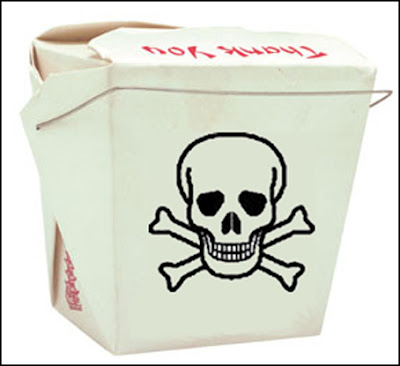 Substances commonly used as industrial dyes, insecticides and drain cleaners were included on a list of illegal food additives China just released as part of a monthslong government crackdown aimed at improving the country's shoddy food safety record.
Substances commonly used as industrial dyes, insecticides and drain cleaners were included on a list of illegal food additives China just released as part of a monthslong government crackdown aimed at improving the country's shoddy food safety record.Let me restate that in case you didn't get it: industrial dyes, insecticides and drain cleaners are now illegal food additives in China.
Among the 17 banned substances was boric acid, commonly used as an insecticide, which is mixed with noodles and meatballs to increase elasticity. Also forbidden was industrial formaldehyde and lye, used in making soap and drain cleaner and added to water used to soak some types of dried seafood to make the products appear fresher and bigger. I just don't know if we'll ever be able to enjoy Chinese food anymore now that they're taking all the good stuff out of it.
The scandal over melamine-tainted infant formula, which likely killed six babies and sickened 294,000 others earlier this year, prompted the government food safety campaign last week. Oh, and then there was all this other stuff too. And this too. The list of banned substances was released by a government committee tasked with weeding out the practice of augmenting food products with nonfood additives. Local authorities were also warned to watch out for another 10 food additives that are often used excessively. The government had previously banned some of the 17 substances as separate scandals rocked the country and raised concerns over products such as milk and eggs, but the list appeared to mark the first attempt at compiling the information.
Also on the list were various industrial dyes that are added to improve the appearance of food products, ranging from chili powder to tea to cooked meats. The government working group even listed an addictive substance made from the poppy plant and related to opium, which can be used as a painkiller. It is often used in hot pot, a Chinese dish where meat, vegetables and tofu are cooked at the table. Along with the banned additives, the government named 10 substances such as colorings, preservatives and artificial flavorings that should not be used excessively. Previously banned items on the list were Sudan red, a cancer-causing industrial dye used to color egg yolks, and melamine, an industrial chemical used in plastics that is added to watered-down milk to fool protein tests measuring nitrogen content.
China is also looking into the practice of adding melamine to animal feed after finding eggs spiked with the chemical in October. China's National Feed Office found 27 cases of contamination among 22,700 samples and forwarded the problematic batches to police, the paper said. China first banned the use of melamine in animal feed in June 2007, after wheat gluten used in pet food was found to contain excessive melamine. The ingredient was blamed for killing dogs and cats in North America.
No comments:
Post a Comment